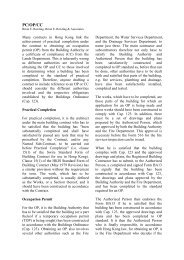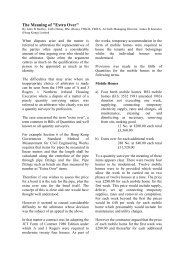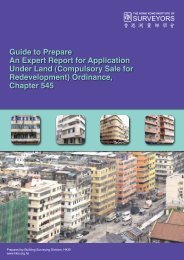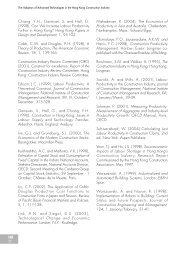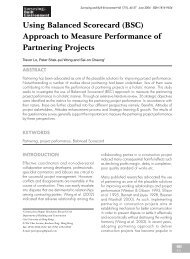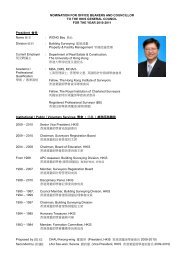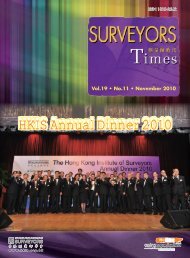Special issue to commemorate the 70th Anniversary of the Battle of ...
Special issue to commemorate the 70th Anniversary of the Battle of ...
Special issue to commemorate the 70th Anniversary of the Battle of ...
You also want an ePaper? Increase the reach of your titles
YUMPU automatically turns print PDFs into web optimized ePapers that Google loves.
War and Peace: Economic Rationales for<br />
Preserving War Relics<br />
Frank T. Lorne*<br />
ABSTRACT<br />
A support for preserving war relics has <strong>of</strong>ten been thought <strong>of</strong> as a support for war. This thought is an incorrect<br />
presumption. Reflecting on <strong>the</strong> techniques and <strong>the</strong> reasoning behind a war can reveal why a war was fought in <strong>the</strong><br />
first place. This exercise can provide valuable learning lessons for a reflection on how society transforms, as well<br />
as pragmatic development prospects for contemplation for <strong>the</strong> future. An understanding <strong>of</strong> <strong>the</strong> economic rationales<br />
behind war and peace generally reveals that wars are a necessary part <strong>of</strong> how humans manage or fail <strong>to</strong> manage <strong>to</strong><br />
live with one ano<strong>the</strong>r. This second order reasoning is required <strong>to</strong> explain any act <strong>of</strong> violence, be it <strong>of</strong>fense or defense,<br />
from <strong>the</strong> point <strong>of</strong> view <strong>of</strong> economics even if <strong>the</strong>re is a default supposition that a zero incidence is <strong>the</strong> optimum<br />
solution.<br />
It has been said that sweetness is only meaningful<br />
when <strong>the</strong>re is bitterness. The same may be true for<br />
happiness and sadness, for success and failure, and for<br />
good and evil. The contrast certainly can be true for<br />
war and peace. Yet, <strong>the</strong> existence <strong>of</strong> opposites goes<br />
beyond a mere balancing force, beyond Yin-Yang as it<br />
were. It possibly goes beyond any duality <strong>the</strong>orem one<br />
can concoct.<br />
However, <strong>the</strong>re exist economic rationales for war as<br />
well as for peace. Thomas Schelling won an economic<br />
Nobel Prize for his Strategy <strong>of</strong> Conflict. 1<br />
He was<br />
credited with having reduced this complex problem<br />
<strong>to</strong> an abstract level <strong>of</strong> game playing. But a war, for<br />
<strong>the</strong> right or <strong>the</strong> wrong reason, has more pr<strong>of</strong>ound<br />
consequence than a game <strong>of</strong> winning or losing. It is<br />
always followed by a streng<strong>the</strong>ning or a changing <strong>of</strong><br />
what I shall call ‘a regime’.<br />
A regime in this sense is a set <strong>of</strong> laws. Laws imply a<br />
system <strong>of</strong> sanctions which citizens <strong>of</strong> a regime will<br />
bear if laws are broken. Wars are <strong>of</strong>ten fought because<br />
<strong>the</strong> representative <strong>of</strong> one regime will not accept <strong>the</strong><br />
imposition <strong>of</strong> <strong>the</strong> laws <strong>of</strong> ano<strong>the</strong>r regime. Whe<strong>the</strong>r<br />
<strong>the</strong> status quo set <strong>of</strong> laws or <strong>the</strong> imposed set <strong>of</strong> laws<br />
would have been sustainable or not is a different<br />
question, but <strong>the</strong> question can affect whe<strong>the</strong>r a war<br />
would have started in <strong>the</strong> first place. All <strong>of</strong> <strong>the</strong>se <strong>issue</strong>s<br />
can ultimately be perceived as an economic question,<br />
whe<strong>the</strong>r for individuals or a nation as a whole. 2<br />
The influence <strong>of</strong> economic fac<strong>to</strong>rs in analyzing war<br />
and peace can be more extensive than <strong>the</strong> calculus <strong>of</strong> a<br />
cost/benefit analysis. Peace certainly does not imply <strong>the</strong><br />
absence <strong>of</strong> conflict. Markets, democracies, and various<br />
sporting events are typical institutions where humans<br />
have found ways <strong>to</strong> deal with <strong>the</strong>ir conflicts. It is easy<br />
<strong>to</strong> condemn war on <strong>the</strong> basis that deaths are involved<br />
in this particular method <strong>of</strong> resolving conflict. But a<br />
death-free mechanism is a desired riskless mechanism.<br />
Traffic lights reduce conflicts at road intersections, but<br />
traffic deaths never<strong>the</strong>less exist, <strong>of</strong>ten due <strong>to</strong> aggressive<br />
driving. Thus, <strong>the</strong> definition and <strong>the</strong> extent <strong>of</strong> war<br />
cannot be based on a body count. It is <strong>the</strong> execution<br />
<strong>of</strong> violence, a purposeful infliction <strong>of</strong> damage <strong>to</strong><br />
enemies, via a combination <strong>of</strong> <strong>of</strong>fense and defense, that<br />
characterizes wars. 3<br />
This essay is written in memory <strong>of</strong> a battle fought in<br />
Hong Kong during World War II, but <strong>the</strong> analysis could<br />
* Pr<strong>of</strong>essor, School <strong>of</strong> Management, New York Institute <strong>of</strong> Technology - Vancouver<br />
1<br />
The 2005 Economic Nobel Prize was shared between Thomas Schelling and Robert Aumann, Schelling’s work was cited as “having enhanced<br />
our understanding <strong>of</strong> conflict and cooperation through game-<strong>the</strong>ory analysis.”<br />
2<br />
Earlier Nobel Prize (1993) winning works by Douglass C. North have provided a pioneer direction <strong>to</strong> this line <strong>of</strong> thinking about institutions and<br />
wars. The reversal in chronological order in referring <strong>to</strong> <strong>the</strong>se two monumental works by economists does not imply which is a more important<br />
approach, as some recent work seems <strong>to</strong> be an integration <strong>of</strong> <strong>the</strong> two.<br />
3<br />
Fighting for <strong>the</strong> purpose <strong>of</strong> providing entertainment <strong>to</strong> specta<strong>to</strong>rs emphasizes <strong>the</strong> skill in <strong>the</strong> combination <strong>of</strong> <strong>of</strong>fense and defense. While that<br />
can provide a reason for studying war relics, this is not <strong>the</strong> emphasis in this essay. In that sense, readers interested in that may find insights in<br />
Schelling’s approach <strong>to</strong> <strong>the</strong> problem.<br />
SBE<br />
8




